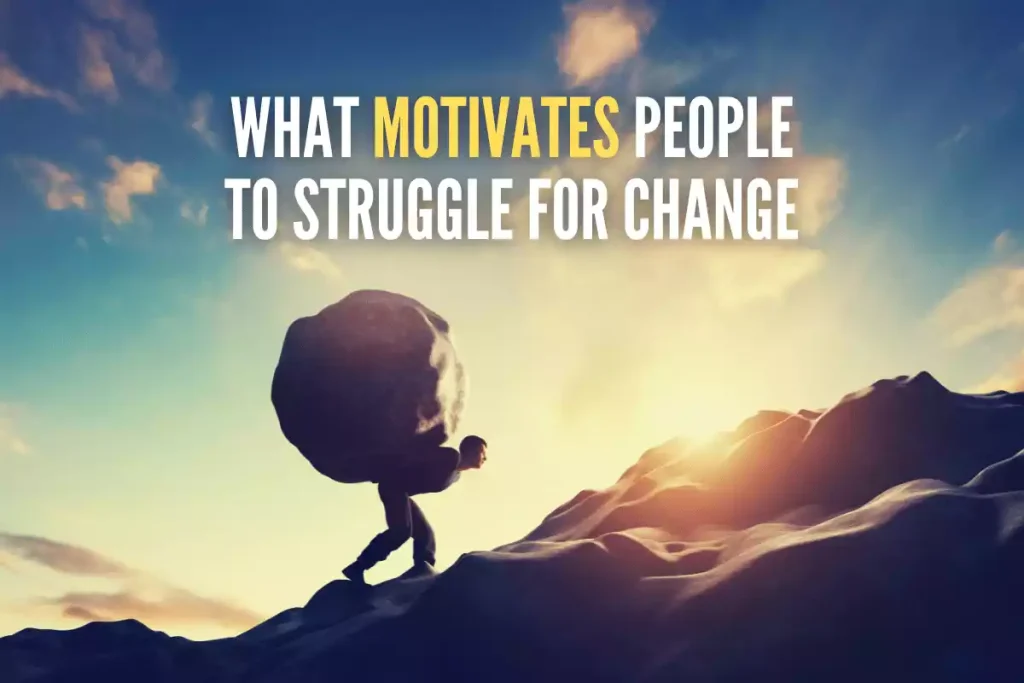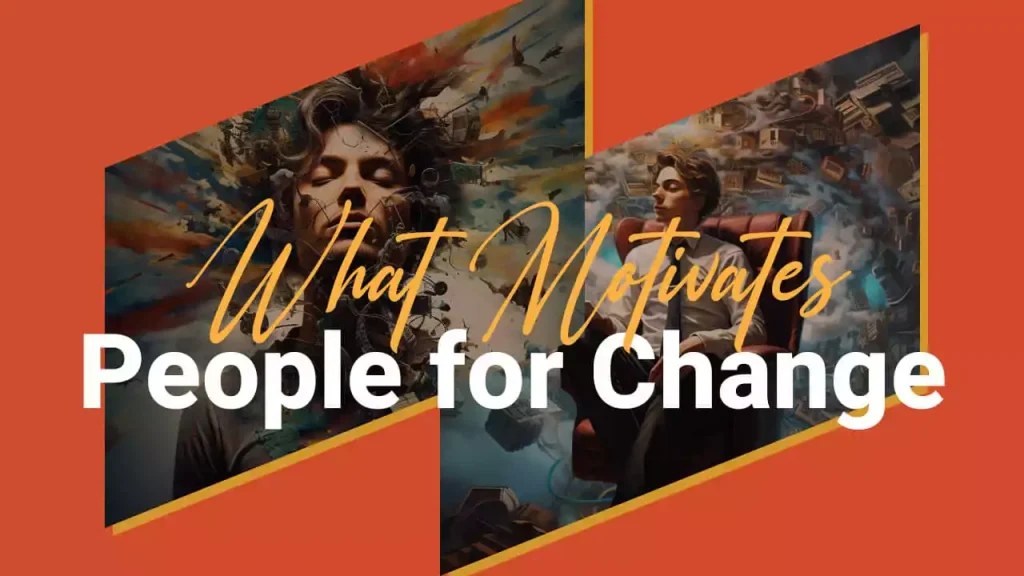Why We Fight: A Look at What Motivates People to Struggle for Change

Why do people try to make life better? It’s a question I keep coming back to. Change can feel like a daunting task, but it’s something we encounter all the time. Occasionally, it’s big, like the civil rights movement in the US. Sometimes it’s small, such as someone looking for a new job or deciding to eat healthier. At the heart of it, people are constantly looking for something better. I wanted to explore what truly motivates us to drive for change.
Table of Contents
Toggle
I researched a lot. My research showed me the key reasons behind people’s actions. I discovered some important ideas. These ideas drive change forward. They are the driving force behind progress. Here’s what I found.
The Heart of the Struggle: What Gets Us Going?
People don’t fight for change just because they’re bored. There’s usually a strong reason behind it. Sometimes it’s personal, sometimes it’s about helping a whole group. Four main ideas kept popping up in everything I read.
Hope and Despair: The Driving Force Behind Social Movements
Hope is a powerful mindset. It shows us a brighter future, not only for ourselves but also for those who come after us. It acts like a “moral battery.” It fuels and sustains social movements. Looking ahead is vital for overcoming the challenges and losses we face on our journey to success.
The struggle for civil rights in the United States lasted for centuries. A strong belief in a fairer future fueled the battle. The 1954 Brown v. Board of Education decision was a key moment in history.
Although the implementation faced strong opposition and took time, it instilled hope in people that they could challenge segregation. This hope sparked further protests and led to increased fighting in the legislature.
Hope and despair are linked. One can lead to the other. When people face big problems like climate change, it’s easy to feel frustrated or hopeless. That can make it hard to take action.
Yet, this feeling of despair can become a strong motivator for change when a fresh, realistic vision emerges. The BUC(k)ET model highlights key social motives behind climate activism. It touches on this important dynamic without directly stating it.
If people feel like they can do something small—like recycle more or obtain clear facts about climate change—they’re less likely to feel overwhelmed. Activists know this and try to make things easier to manage.
People hope for something more. We all want a better life. This belief is true for ourselves. It is also true for our kids. We want them to have excellent schools. We want them to be safe.
This hope drives us forward. It helps us keep going. Look at the women’s rights movement. Women wanted to vote. They wanted a voice. They had hope for a more equal future. Hope is a compelling feeling. It can motivate us to do difficult things.
Simple, practical solutions can help people feel hopeful again and turn frustration into action. It’s not enough to just talk about what’s wrong—people need real answers that make them feel like they can do something.
Addressing Injustice: From Complaints to Collective Change
Injustice often starts with one person’s complaint, but real change happens when people come together. Working as a group is what makes a difference. That’s how we move towards a fairer world.
When people face unfair treatment, it drives them to take action. This idea is central to theories about how social change happens through grievances.
Psychological theories, such asRelative Deprivation Theory, suggest that when people feel they aren’t getting the rewards or recognition they deserve, it can lead to frustration and a desire for change.
This has driven many movements throughout history. Over 400 years of history shaped the American Civil Rights Movement. Slavery, racism, white supremacy, and discrimination marked this history. These issues were pivotal to the nation’s development.
Think back to when Black Lives Matter began in 2013. The movement started after the deaths of Trayvon Martin, Michael Brown, Eric Garner, Rekia Boyd, and others. It brought attention to deep, ongoing injustice in society.
Spotting injustice isn’t just about facts—it’s about feelings too. Social movements use clear, strong language to highlight what’s wrong and motivate people to take action. illustrates how a local issue can become a shared concern. It turns a personal complaint into a common concern for all of us.
This perspective matters. It helps people see that they can work together to make a real difference. If we don’t share this view, frustration remains private and doesn’t transform into the energy needed for a larger movement.
Love and a Sense of Community
We fight for change because we believe in standing up for the people we care about. Many of us fight for change because we care about our friends, family, and community. Wanting to help the people around us is a significant reason people get involved in our behavior.
The relationships we build, the support we receive, and the recognition from others all greatly influence our choices to take action. History repeatedly demonstrates this idea.
A great example is theMontgomery Bus Boycott. During this time, the Montgomery Improvement Association (MIA) united to make a strong statement.
The abolitionist community closely linked itself to the early women’s suffrage movement. These groups had common beliefs. They employed strategies such as mass petitions and public speaking to drive their fight for change.
The BUC(k)ET model highlights that feeling a sense of belonging is a significant factor in why people join climate activism. When we collaborate as a group, we can achieve a more significant and enduring impact compared to working independently.
Feeling lonely and defeated can happen when you face big challenges alone. However, when we come together, we share the energy, passion, and drive of everyone who aims for the same goal.
Feeling like we belong gives us a strong support system. It helps us push through, even when times are tough. Let’s keep the momentum going. Together, we can embark on the challenging journey to create lasting change. It would be nearly impossible to do this alone.
A Deep Belief in Freedom
A significant aspect of American history is the struggle for freedom and equality. It’s something we see again and again.
People like Martin Luther King Jr. and Rosa Parks stood up for equality because they believed everyone deserves freedom. This belief is strong enough to make people take risks and push for change.
A strong belief in freedom is what drives many movements. It brings people together and gives a movement its purpose and energy. This idea is at the heart of how social movements work.
It says that movements create meaning from events and shape experiences. This helps people decide to take action. The Civil Rights Movement is a wonderful example of this. The movement linked its goals to the core promise of American democracy.
They focused on the idea from the Declaration of Independence that all people are equal. By doing this, they put pressure on the government to uphold its promises. The movement saw its efforts not as rebellion, but as a way to assist America in fulfilling its promises.
Powerful Words: The Quotes That Inspire Us
Words matter. They can give us courage and remind us why we keep going. I found some excellent quotes that show what motivates people to fight for change. They’re like little sparks of wisdom.
- “Be the change you wish to see in the world.” – Mahatma Gandhi. This quote tells us something important. We can start the change ourselves. We do not need to wait.
- “Injustice anywhere is a threat to justice everywhere.” – Martin Luther King Jr. This quote is so strong. It means we should be concerned about all forms of injustice. This extends beyond the injustices that directly impact us. It reminds us we are all connected.
These quotes are brief, but they hold great significance. Sometimes, just a few words are all it takes to inspire us to take action.
Lessons from History: The Road to Rights Isn’t Straight
Change is rarely a straight line. It’s more like a zigzag road, full of ups and downs. If you look at history, you’ll see that every movement has its setbacks as well as its wins.
This back-and-forth is what gives social movements their strength. Even when things get tough, each small step forward matters. It’s a reminder that progress can be slow, but it’s still progress.
Here’s a quick summary:
Lessons From History: The Zigzag Road to Rights
History doesn’t move in a straight line. It’s full of bumps and turns. That’s what I call the Zigzag Road to Rights. For example:
- Civil rights wins, then tests.
- Women are gaining the right to vote, yet still fighting pay gaps.
- Climate protest wins, then backslides.
a. The Civil Rights Movement: Fighting for Change with Peace and Protection
The Civil Rights Movement was about more than just freedom. It was a powerful answer to unfair laws that treated Black people as less important. The movement is renowned for its peaceful protests, but there was much more to it. Leaders made careful plans.
They knew that remaining nonviolent, even when attacked, would demonstrate to the world the unfairness of the situation. When people saw the violence on TV and in newspapers, it pushed the government to act. This led to significant changes, such as the Civil Rights Act of 1964 and the Voting Rights Act of 1965.
But there’s another side to the story. While the movement’s message was peaceful, some activists also took steps to protect themselves and their communities. People like Griffin McLaurin and Walter Bruce talked about watching over their neighborhoods to keep families safe from racist violence.
This demonstrates that sometimes, different situations require different responses. Peaceful protests brought people together and got attention, but self-defense helped keep people safe. It’s a reminder that winning change often takes more than one approach.
b. The Women’s Rights Movement: Fighting for Equality and Change
The story of women’s voting rights in the U.S. is marked by both struggles and successes. It’s a tale of difficult times and great wins that happened over many years. Obtaining the right to vote for women was a challenging endeavor.
There were many ups and downs, with laws changing and people in the movement not always agreeing. In 1807, women in New Jersey lost their right to vote. This was a big setback that lasted for many years. More than a hundred years later, brave and determined people finally changed that law.
The suffrage movement didn’t always work together. It had disagreements on important topics, with one of the biggest being the 15th Amendment. This law allowed Black men to vote, but it excluded women entirely. Initially, some suffragists primarily focused on a small group of women.
They left working-class women and women of color behind. These women dealt with various challenges that were often overlooked. The fight for suffrage didn’t succeed because of just one moment or action.
There were many efforts involved: talking to people, fighting for what’s right, and even going on hunger strikes. Each of these actions was important in getting the vote for women.
3. Two Contemporary movements: Black Lives Matter & Climate protest
Climate protests have really changed global climate policies. They demonstrate how ordinary people can make significant changes. In 2024, young people in groups like Fridays for Future and Extinction Rebellion celebrated amazing wins.
More than 1.4 million people came together in Germany for Fridays for Future to demand action. They urged political leaders to make plans to keep global warming below 1.5°C.
In the UK, the Just Stop Oil campaign made the government halt new licenses for oil and gas projects. This decision will leave more than 4.4 billion barrels of oil untouched. That’s great for the Earth!
Legal victories have also played a significant role in climate progress. For example, the European Court of Human Rights said Switzerland wasn’t doing enough about climate change, which set an example for other countries.
In the UK, the Supreme Court ruled that new oil projects must consider the pollution caused by burning fossil fuels. This could slow down new oil projects and help the environment.
These victories demonstrate the growing strength of climate protests. They’re changing laws and pushing governments to do more. When people work together, they can hold leaders accountable and help shape a better world.
Modern movements demonstrate that the fight for justice remains strong, even as the issues evolve. Take Black Lives Matter, for example. It started as a response to police brutality, but it’s really about tackling bigger problems like anti-Black racism.
Activists aren’t just fighting for today—they want a safer, fairer world for the future. Climate activism is the same. It’s about protecting the planet for ourselves and for future generations.
Both movements face new challenges. For example, Black Lives Matter doesn’t have a single leader or strict structure like older movements did. This allows local groups to lead, but it can also make it hard to keep everyone on the same page. It takes teamwork and flexibility to keep things moving in the right direction.
Related Data Table
| Movement Name | Core Motivations | Key Tactics | Major Legislative and Social Setbacks | Key Outcomes |
| Women’s Suffrage | Equality, rights, abolitionism, social justice | Lobbying, public speaking, mass petitions, civil disobedience, picketing, and hunger strikes | Exclusion from the 15th Amendment, legislative reversals (e.g., in New Jersey), internal schisms, and hostility/violence against protesters | 19th Amendment ratified (1920), granting women the right to vote |
| Civil Rights | Injustice, equality, hope, love for community, and unalienable rights | Nonviolent resistance, marches, boycotts, sit-ins, protests, “Freedom Rides.” | Violent resistance, lynching, legal segregation (Jim Crow laws), de facto residential segregation, assassination of leaders | Civil Rights Act of 1964, Voting Rights Act of 1965, desegregation of public facilities |
| Black Lives Matter | Injustice (police brutality, anti-Black racism), anti-racism, racial inequality | Decentralized local organizing, protests, social media campaigns, policy reform proposals | Criticized as encouraging violence, political opposition (e.g., from the Trump administration), funding mismanagement, lack of focus on specific issues | Increased public awareness of systemic racism, police accountability (e.g., Derek Chauvin conviction), policy reform discussions |
| Environmental Movements | Environmental Protection, Sustainability |
public speaking, mass petitions, | Criticized as encouraging violence, political opposition | Establishment of National Parks, Environmental Protection Laws |
How Technology, Words, and New Ideas Are Driving Change in the Future
People have always sought things like fairness and justice, but the methods we use to push for change have evolved significantly. Now, technology—especially social media—allows people to share their message quickly and reach a huge audience.
It’s easier than ever to organize and connect. However, there are also drawbacks, such as the rapid spread of misinformation or the loss of important messages amidst the noise. These new tools are transforming how we bring about change.
The Power of Words: Quotes, Slogans, and Social Identity
Inspiring quotes and slogans are not just catchy phrases or quick bits of wisdom. They are strong tools that can inspire people to take action. They achieve this by using the right words, understanding what motivates us, and tapping into our emotions.
These clear and powerful messages unite people by offering a shared language and identity for the group. Use the saying, “Be the change you want to see in the world.” It motivates people to become involved and be part of something greater. The quote by Martin Luther King Jr.,
“Injustice anywhere is a threat to justice everywhere,” exemplifies how the actions of one person can impact the broader fight for justice. It reminds us all that making a change is up to each of us.
Furthermore, explore the battle of motivation vs. consistency
Today, in our quick-moving digital world, people have shorter attention spans. These concise and impactful messages align perfectly with the times. A single quote can convey complex ideas concisely. It makes them easy to understand and share.
These are excellent for getting people to take action. On social media or in daily chats, these messages provide a clear sense of right and create an emotional bond. They help people transition from simply watching to actively getting involved in making a difference.
In today’s fast-paced world, a powerful quote can spark a movement and share its message with millions in just seconds.
The Digital Frontier: Social Media’s Dual Role
Social media has revolutionized the landscape of today’s social movements. It helps people share information, collaborate, and quickly gather large groups. It’s a spot where folks can discuss problems, share their feelings, and connect to build a strong community, even if they live in different cities or countries.
The Black Lives Matter (BLM) movement wouldn’t be as big as it is today without social media. It helps activists come together locally without needing a central group. This grassroots approach helps movements be more flexible and adapt to new challenges. Earlier movements didn’t have this ability as easily.
Social media is excellent for connecting people and sharing ideas, but it also comes with new challenges. Nowadays, it’s effortless to “like” or “share” a post. However, such behavior can lead to what some people call “slacktivism.”
This syndrome occurs when people believe they’ve done enough by clicking online, without actually getting involved or taking real-world risks. Clicking buttons online can help spread the word, but real change happens when we take action.
This means marching, boycotting, or standing up for what’s right in ways that truly matter. Social media is great for sharing information and bringing people together. But real change happens when people meet face-to-face and take action together.
The Struggle Today: Modern Examples

Pic credit: Pinterest
Change is not just a part of history. It happens right now. We see it all around us. Social media plays a significant role in this, as we discussed earlier. People share their stories. They raise money for a cause. It is a new way to protest. We see it on TikTok and Instagram. This act shows how ordinary people can start a movement.
We see modern struggles in the United States. Think about the Black Lives Matter movement. People want to end police brutality. We see people fighting for the environment.
We see people fighting for LGBTQ+ rights. All these movements are about change. They are about improving things. They show us that the fight is not over. It is a constant part of life. They demonstrate that ordinary people have power.
Tools I Use to Learn
I utilized several different tools to assist with my research. If you’d like to learn more, consider using Quizlet. You can find flashcards about social movements, important dates, and key people.
I found it really useful for organizing information and making learning more fun. Just search for topics such as ‘what motivates people to fight for change’ and see what you discover.
Why We Fight: A Last Thought
Here’s what I learned: people don’t fight for change because it’s easy. They do it because they have to. Hope, a sense of fairness, caring for family, and a belief in freedom are all stronger than fear or just working hard. These feelings are what really drive people to act.
When we know what motivates people to fight for change, we see why every voice matters. Even small actions can add up to significant changes. Everyone’s effort counts. Change starts with one person and one idea, then grows into something bigger—a force for good.
Frequently Asked Questions
What is the main reason people fight for change?
People want change for different reasons. People want a better future, strongly oppose injustice, care for others, and genuinely believe in freedom and equality. These feelings motivate individuals to take action, even during difficult times.
How does hope motivate people to struggle for change?
Hope really drives us forward. It shows people a way to a better future for themselves, their families, or their communities. This hopeful view helps them stay strong and keep moving forward, even when they encounter challenges. Believing that things can improve drives the struggle.
What are some examples of people struggling for change in history?
The civil rights movement is a strong example. Martin Luther King Jr. and Rosa Parks stood up for racial equality. Another example is the women’s suffrage movement. Women worked hard for many years to get the right to vote. These historical events illustrate the challenging journey to change.
.
What role do quotes play in motivating people?
Quotes are little pieces of inspiration. They can inspire people and help them stay focused on their goals. Great quotes from leaders like Mahatma Gandhi and Martin Luther King Jr. capture important ideas. They can help someone feel part of a bigger cause.
How can a person start to make a change?
Change usually begins with little steps. A friend can stand up for another friend. They can be part of a local group. People can use social media to spread a message. Change doesn’t always mean a big protest. It can start with a small, kind, or brave action. Everyone’s effort counts.


